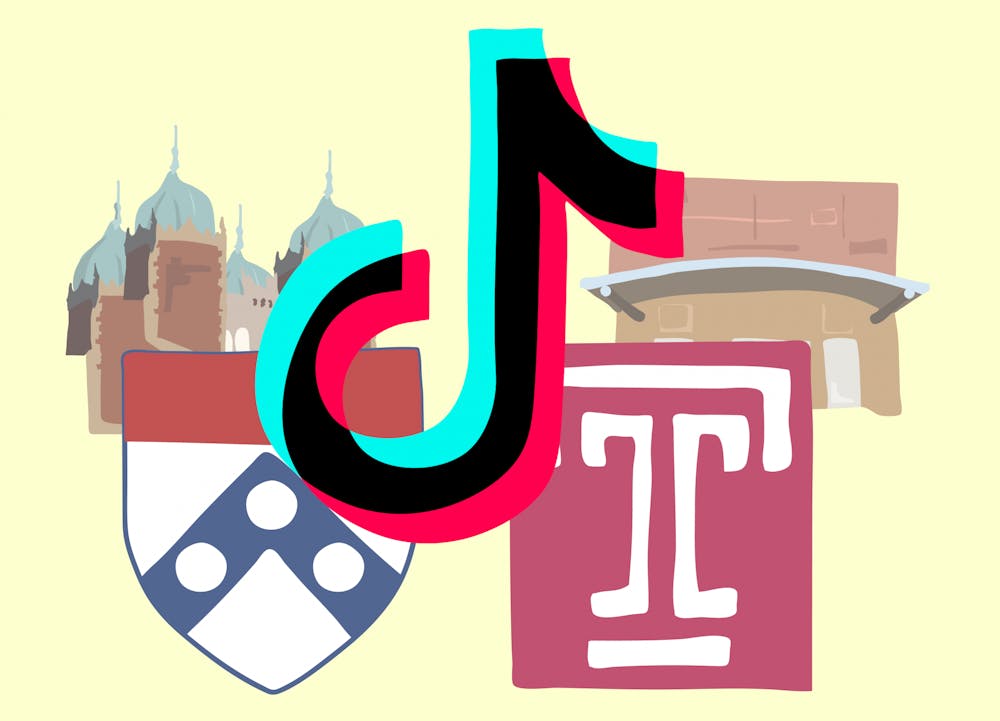The walk from the El stop on 40th and Market streets to Locust Walk is a peculiar journey. Ascending from the bustling public transportation hub, commuters can't miss the neon lights of small businesses dotting Market street, the groups of men conversing on street corners, and the publicly subsidized housing site just across the road. Just a block away appears Jose Garces’ upscale Mexican restaurant, Distrito. Suddenly, the red and blue insignia of the University of Pennsylvania appears, drawing one into the bubble that is University City.
West Philadelphia isn’t the only section of Philadelphia that has been gentrified by a university. Temple University, in the North Broad section of Philadelphia, has expanded their control over the surrounding neighborhood with campus housing, student–serving businesses, rising rent prices, and overall, a higher cost of living.
As a result of increasing segregation between the university and the community, many Temple students and faculty members have little connection to the community upon which their institution impedes. In 2016, journalist and author Ta–Nehisi Coates blamed the poor relationship between Temple University and North Philadelphia on the concept of "plunder:" how resources, property, and ideas are taken by force by an oppressor. Without compensating, Temple plunders the residential streets, affordable housing, small businesses, and community values of North Philadelphia.
The ignorance many Temple students have regarding plunder was made wholly apparent during the rise of TikTok. Some used the app to mock the surrounding community, deeming it as dangerous, unclean, and disorderly. In December 2019, a then first year at Temple posted a video to the app referring to Temple’s off–campus neighborhood as “the ghetto.” After a critical response to the video from North Philadelphia residents, Temple issued a response condemning the video as “upsetting, disappointing and never acceptable.” Unfortunately, this was not the last instance of Temple students’ oblivion to their Cecil B. Moore bubble. As the Class of 2025 prepared to move onto campus, the "TempleTok" insensitivity resurfaced.
Searching “Temple University” in the TikTok search bar is a gamble. You may come across videos praising the school for its top–notch football program, exciting party scene, and dynamic academics.
Other times, you may find the platform of students who are incapable of recognizing their privilege. One video’s captions reads “Yeah I went to college in North Philly, but I don’t think it affected me that much.” In the next clip, the student is seen walking in front of a green–screened image of North Broad Street. The text reads “*casually walks past gun shot sounds without being spooked*.”
Qamar Coleman (C ‘25) grew up in the East Oak Lane section of Philly and attended Carver High School of Engineering and Science in North Philly, blocks away from Temple’s campus.
“We would always hear about Temple kids complaining like ‘Oh North Philly is so bad, it's so dangerous … ’ One of the things you heard them say a lot was that Philly was super dirty,” Qamar says. However, he elaborates on how the lack of cleanliness can be attributed to Temple’s students, saying, “As a student at Carver, I walked to school near the Temple frats. There would be mountains of trash … I don’t mean like six or seven trash bags, I mean literal mountains of trash.”
Temple students’ criticism of North Philly is ironic because they cause their own concerns. The streets housing Temple frat houses wouldn’t be lined with trash without students littering on their walks home from parties. “It's almost like [Temple students] want to play the victim and want people to pity [them],” Qamar says about TempleTok insensitivity. If a student is not prepared to live in an urban environment and respectfully live in neighborhoods alongside their residents, they shouldn’t choose to attend a school like Temple University.
In response, creators from North Philadelphia are stitching videos criticizing their neighborhood to share their perspective. One such creator, a Black Temple student, @medusagoawf on TikTok, responded to a video of a Temple student speculating about being jumped in North Philly, in a since deleted TikTok.
“I’m so tired of white people coming into predominantly Black areas and acting like they are the ones in need of protection, when in actuality, they are the most destructive,” she said in the video.
The criticisms of TempleTok are similar to those targeting the Penn community, as Penn too is guilty of gentrifying the communities of lower–income residents of color. Penn’s influence extends beyond Locust Walk in its staff and student housing, ever—expanding campus, and careless under–serving of the West Philadelphia area.
Gabrielle Bioteau (E '23) grew up and attended West Catholic High School in West Philly before attending Penn. She echoes Qamar’s sentiments, saying, “I’ve definitely heard Penn students say that nothing past 40th Street is safe. I’m from 49th Street, so it’s definitely annoying for me to hear ... When they do wander past [40th Street], they say ‘It’s actually not so bad.’ ... what did you expect?” These frustrating comments are the Penn alternative to TempleTok, perpetuating a disconnect between our school and its surrounding community.
The gentrification of University City, or “Penntrification,” forces Philadelphia's already vulnerable Black population out of their homes and brings white families and students into their former neighborhoods. While the emotional toll brought upon those displaced is immeasurable, researchers have calculated that alongside a general decrease in the Black population in Philadelphia, the Black population in West Philly specifically has decreased by 29% between 2000 to 2012, a staggering demographic shift. As the neighborhood becomes more white, property values continue to increase exponentially, pushing Black residents further West, and banishing them further from Penn's campus.
Penn and Temple students move to urban areas and complain when they are exposed to crime. TempleTok is an example of students in higher–education at wealthy institutions victimizing themselves of crime that has plagued Black and brown communities for years.
Echoing a sentiment felt by many Philadelphians, Qamar says, “If you had such negative connotations [about Philadelphia], why choose these schools?”







